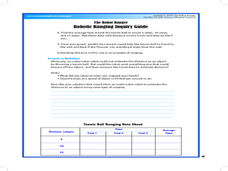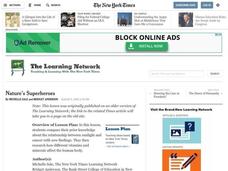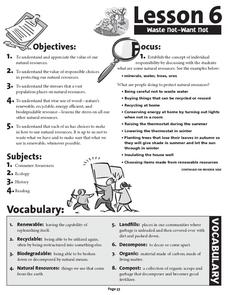Discovery of Sound in the Sea
How to Build a Hydrophone
The materials and procedures for building a hydrophone, an underwater sound collecting device, are provided in this resource. Have high school oceanographers construct the underwater microphone to pick up sound waves. Then take...
Curated OER
South Africa
Have your class learn about South Africa and prepare for a discussion using this resource. Learners read a 3-page article about the nation and then note details about apartheid, Afrikaners, Nelson Mandela, and more on the provided...
Curated OER
Shake, Rattle and Roll
Learners compare the weathering of different-sized materials. Comparisons are made and data analyzed to reach conclusions about the process of weathering. Applications can be made for the higher grades.
Curated OER
What Makes Up Rocks and Soils?
In this rocks and soils instructional activity, students will complete a Venn diagram comparing the specific characteristics of rocks and soils.
Curated OER
Exploration Activities
Middle schoolers examine the stages in finding, removing, and processing mineral resources. They participate in the "Exploration Hunt" and "Leasing Mineral Rights" activities to better get a handle on their studying.
Curated OER
Understanding My Pyramid
Students investigate the food pyramid. In this nutrition lesson, students view and discuss the food pyramid and the role it plays in our diets. Students develop a three dimensional model of the food pyramid and create a nutritious meal...
Curated OER
What's in the Soil?
Fourth graders examine soil to find its contents, and how much water and air they can measure. In this soil composition instructional activity, 4th graders perform three experiments and record their results. In one experiment...
Education World
Every-Day Edit: Alaska, the 49th State
For this editing activity, students read and edit a short passage entitled, "Alaska, the 49th State." Students look for 10 errors in capitalization, punctuation, spelling and/or grammar.
Curated OER
Soil in My Food Web
Fourth graders understand the importance of soil to the food web. In this food web lesson, 4th graders create various food webs beginning with soil using yarn and name cards. Students write about the importance of soil to one...
Curated OER
The Robot Ranger
Students participate in an experiment to understand how robotic systems can estimate distances. In this robotic ranger lesson, students measure the the time it takes for and object to move back and forth. Students will use a...
Curated OER
When Disaster Strikes! Rocks, Minerals, Erosion and Weather
Learners pretend the area they live in is subject to wind, waves and rain. In groups, they pretend they are a groups of meteorologists or geologists and are to report on the weather and damage that could occur there. Each group develops...
Curated OER
Land Use Issues
Pupils observe and describe the properties of rocks and their significance relationship in the environment. They explain the implications of destroying habitats and the importance of rebuilding them.
Curated OER
The Formation of Resources
In this rock worksheet, students review the three types of rocks and their distinguishing characteristics. This worksheet has 10 matching and 10 short answer questions.
Scholastic
Study Jams! Metamorphic Rocks
Photographs of magnificent metamorphic rock formations make up the bulk of this brief slide show. Along with the upbeat background music, slow-moving slides, and informational captions of the slide show, you will also find key...
Scholastic
Lesson One: The Earth, Background and Glossary
How much do you really know about our planet? Middle schoolers build up their prior knowledge about Earth, its placement in the solar system, its composition, and important geological vocabulary with an introductory earth science lesson.
Teach Engineering
Rocks, Rocks, Rocks: Test, Identify Properties and Classify
Time is growing short. Teams work together to identify physical properties of rocks in order to determine the properties that would best suit their cavern shelter design.
Curated OER
Nature's Superheroes
Learners compare their prior knowledge about the relationship between sunlight and cancer with new findings. They research how different vitamins and minerals affect the human body.
Curated OER
Mining For Descriptive Gold
Students describe places using language that is as vivid as possible. They will examine the writer's craft in describing a place by reading and discussing "Resurrecting the Miner's World." They will then revise their descriptive pieces...
Curated OER
Census and Gold Rush Town
Students analyze data and form a mental picture of the make up of a gold rush town. They explain social life in a gold rush town. They use online sources to see paintings of camp life and read accounts of miners' lives.
Curated OER
History of the American West
Ninth graders research early mining in California. They study the "placer method" for mining gold, which is surface mining that does not involve tunneling. They examine what it was like for the early miners to pan for gold with...
Alabama Learning Exchange
The Birth of Rock(s) - Identifying Rock Types
Young scientists investigate types of rocks in this instructional activity. They collaborate to examine groups of rocks, make written descriptions of them, and use websites to help them identify the types of rocks they are.
Curated OER
Waste Not Want Not
Young scholars are introduced to the need to save natural resources. Through inquiry, hands-on activities, and problem solving, students increase their understanding of solid waste materials and the need to reduce, recycle, and reuse.
Curated OER
Recycle, Reduce, Reuse and Save a Tree
Students examine how to save and protect trees. In this conservation instructional activity, students read books about the usefulness of trees, write ideas in their journals about how trees can be used, and make a book of ways to...
Curated OER
Marine Archaeology
Students examine marine archaeology. In this archaeological data lesson, students see how archaeologists use data to make inferences about shipwrecks. Students read data and make their own inferences, write about marine life and...

























